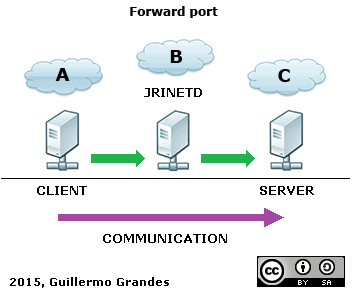Awesome
jrinetd
jrinetd is an open source (Apache License, Version 2.0) Java TCP port redirector proxy. Do not require any external lib.
Current Stable Version is 1.1.2
DOC
Schema about Forward / Port Redirector:

- Machine-A (Client) init connection to Machine-B (jrinetd)
- Machine-B init connection to Machine-C (Server)
- Done: Machine-A is able to speak with Machine-C
Notes about security:
- Machine-A (Client) may be in Internal network.
- Machine-B (jrinetd) may be in DMZ.
- Machine-C (Server) may be in External network.
System Properties (optional)
# To redir stdout/stderr to (auto-daily-rotated) files you can use:
-Dlog.stdOutFile=/var/log/jrinetd.out -Dlog.stdErrFile=/var/log/jrinetd.err
# To log to stdout too:
-Dlog.stdToo=true
Filenames are a base-pattern, output files they will be: jrinetd.xxx.YEAR-MONTH-DAY (jrinetd.xxx.2015-08-01)
Config (jrinetd.conf)
Config file must be in class-path ${JRINETD_HOME}/conf/, general format is:
#### Forward / Port Redirector
## forward <listen-addr>:<listen-port> <endpoint-list> [opts]
# Note: <endpoint-list> can be a coma separated list of addresses, like "srv1:80,srv2:80,10.0.0.3:8080"
Options are comma separated:
- Options for outgoing connections
- Loadbalancing (only one option can be used)
- LB=NONE: disable LoadBalancing
- LB=ORDER: active LoadBalancing in order (DNS resolved IP address are sorted, lower first { 10.0.0.1, 10.0.0.2, 192.168.0.1 })
- LB=RR: active LoadBalancing in round-robin (DNS order)
- LB=RAND: activate LoadBalancing in random order
- LB=RANDRR: activate LoadBalancing in random order and round-robin
- Failover (default disabled)
- FAILOVER: enable FailOver (if connect fail, try next address)
- Sticky Session
- STICKY=MEM:bitmask:elements:ttl:sticky-name[:cluster-name]: activate Sticky session based on IP Source Address. Sessions are stored in MEMory, bitmask is a CIDR to apply in source-ip-address (16=Class B, 24=Class C, 32=Unique host), elements for LRU cache, ttl is time to live of elements in cache (seconds), sticky-name and cluster-name in cluster environment is cluster identifier and replication identifier respectively.
- Loadbalancing (only one option can be used)
- Options for inbound connections
- PROXY=SEND: use PROXY protocol (v1), generate header for remote server
Example config of Forward / Port Redirector:
# <listen-addr>:<listen-port> <endpoint-list> [opts]
forward 0.0.0.0:80 10.0.0.1:8080,10.0.0.2:8080
forward 127.0.0.1:443 www.acme.com:443 LB=RR,STICKY=MEM:24:128:300:sticky1
- More examples in sampleconf
Running (Linux)
./bin/jrinetd.sh <start|stop|restart|reload|status>
TODOs
- Use Log4J
- Limit number of connections
- Limit absolute timeout/TTL of a connection
- Configurable retry-sleeps
- Thread pool/control
- Custom timeout by binding
- Audit threads / connections
- Statistics/Accounting
- JMX
DONEs
- NIO (v1.0.0)
- BufferPool for reduce GC pressure (v1.0.0)
- Reload config (v1.0.0)
- Allow alternative config names (v1.0.0)
- Zip Packaging (Maven Assembly) (v1.0.0)
- Allow redir stdout/stderr to File, with auto daily-rotate (v1.0.0)
- PROXY protocol (v1) for Outgoing connections (v1.0.0)
- Multiple endpoint-list (not only DNS multi A-record) (v1.0.0)
- Sticky sessions in LoadBalancing (v1.0.0)
- Use multiple thread for multi-core machines (v1.0.0)
- Replicate Sticky Sessions over multiple jrinetd (HA) (v1.0.0)
- Improved support for embed -a little- (v1.1.0)
MISC
Current harcoded values:
- Buffer Pool size: 8192buffers (per thread)
- Buffer-Length for I/O: 2048bytes
- DNS cache: 3seconds
- Reload config check time interval: 10seconds
- Shutdown/Reload timeout: 30seconds
- Cluster Connection timeout: 10seconds
Latency Benchmark
<table> <tr align="right"> <th>microsecs</th> <th>Direct</th> <th>Forward</th> </tr> <tr align="right"> <th>min</th> <td>?</td> <td>?</td> </tr> <tr align="right"> <th>max</th> <td>?</td> <td>?</td> </tr> <tr align="right"> <th>avg</th> <td>?</td> <td>?</td> </tr> </table>Throughput Benchmark
<table> <tr align="right"> <th>(transfers)</th> <th>Direct (x2)</th> <th>Forward (x4)</th> </tr> <tr align="right"> <th>Mbytes</th> <td>?</td> <td>?</td> </tr> <tr align="right"> <th>Mbits</th> <td>?</td> <td>?</td> </tr> </table>All test run on localhost on a Laptop. Values are not accurate, but orientative. Latency { EchoServer, 1 byte write/read (end-to-end, round-trip), 100K iterations } Lower Better. Throughput { Chargen, 1024bytes read & write (full-duplex), total 512MBytes } Higher better.
Inspired in rinetd, this is a Java-minimalistic version.